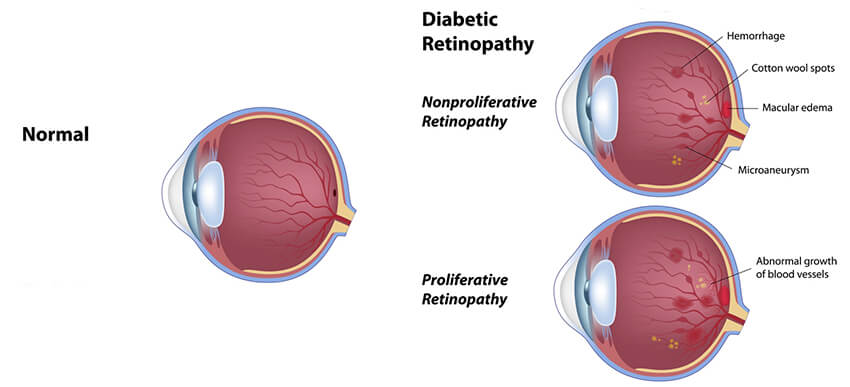Patients with diabetes are susceptible to numerous health problems, many of which impact eye health. Diabetic retinopathy, a disease that affects the retina, is a serious condition that can result in permanent vision loss. At Eye Physicians Associates, we take preventative care very seriously. Diabetic patients are encouraged to schedule regular eye examinations to ensure optimal eye health.
How Does Diabetes Affect the Eyes?
Many diabetic patients notice blurry vision when their blood sugar is either too high or too low. It’s critical to manage blood glucose levels in order to avoid serious and permanent vision loss. Erratic blood sugar levels can also change the shape of the eye.

Types of Diabetic Eye Disease
There are a group of more serious eye conditions that can develop from blood glucose levels that are elevated over a long period of time. Most patients don’t notice the symptoms until permanent vision damage has occurred.
Diabetic Retinopathy affects the blood vessels in the retina, the light-sensitive tissue at the back of the eye. In its early stages, vision loss can be contained with proper medical management. However, diabetic retinopathy can lead to severe vision loss and blindness if the patient isn’t following a diabetic treatment plan.
There are three stages of diabetic retinopathy:
- Non-proliferative retinopathy (NPDR) is the early stage of the disease. Small areas of swelling occur in the retina and capillaries (tiny blood vessels) can begin to leak. Another problem that occurs with NPDR is that the blood vessels to the macula can close off. This is called macular ischemia.
- Proliferative retinopathy (PDR) is an advanced stage of diabetic retinopathy. When blood supply to parts of the retina are shut off, growth factors are secreted that generate the development of new blood vessels. These new blood vessels grow along the surface of the retina and into the vitreous gel (fluid that fills the back of the eye). The fragile blood vessels often bleed and leak.
- Retinal Detachment is a dangerous side effect of PDR. Scar tissue from the leaking blood vessels can contract and cause the retina to pull away from its underlying tissue. This can result in a sudden loss of vision or blindness.
Diabetic Macular Edema (DME) is associated with diabetic retinopathy. Fluid (edema) builds up in the macula, which is the central part of the retina. This can damage central vision if not treated properly.
Cataracts are a clouding of the eye’s natural lens. Adult diabetics are 2-5 times more likely to develop cataracts, and they often occur at a younger age.
Glaucoma is a group of diseases that damage the optic nerve, which connects the eye to the brain. Many types of glaucoma are caused by elevated pressure in the eye. Diabetics are twice as likely to develop glaucoma as people in normal health.
Diabetic Eye Symptoms
It’s very important for diabetics to watch for symptoms that can indicate diabetic eye disease. If you experience any of these symptoms, contact your eye doctor immediately.
Symptoms of Diabetic Retinopathy
- Blurry vision
- A shower of black “floaters” in the eye
- Loss of vision from the side of the eye

What its Like to See With Diabetic Retinopathy
Symptoms of Macular Edema
- Cloudy central vision such as difficulty with reading
- Straight lines seem blurry or distorted
- Trouble with night driving
Symptoms of Retinal Detachment
- Sudden or gradual increase in “floaters” in the eye
- Light flashes in the eye
Prevention
Vision loss from diabetic eye disease is often irreversible.
However, blindness can be prevented by following these important steps:
- Schedule a comprehensive eye examination annually or as often as your eye doctor recommends. This exam should include dilation of the pupils, so your doctor can see the back of the eye
- Maintain a healthy A1C level by controlling blood sugar
- Control high blood pressure and high cholesterol
- Quit smoking
Treatment of Proliferative Retinopathy
Scatter Laser Surgery or Panretinal Photocoagulation has been used for many years to help shrink blood vessels, and thus reduce swelling of the retina. It involves creating 1-2 thousand tiny burns in the retina. Unfortunately, scatter laser surgery sometimes damages the peripheral (side) and night vision while preserving the central vision.
Anti-VEGF Injections are medications injected into the vitreous gel to block a protein called vascular endothelial growth factor (VEGF). This protein stimulates the formation of abnormal blood vessels. Anti-VEGF injections were originally used for diabetic macular edema, but they have also been proved useful in earlier stages of retinopathy.
Vitrectomy Surgery is sometimes recommended for advanced PDR. In this surgery, your retina specialist will remove blood and vitreous gel from the back of the eye. This allows light rays to focus correctly on the retina, so you can see clearly.
Treatment of Diabetic Macular Edema
Anti-VEGF Injections are used to block and reverse abnormal blood vessel growth and decrease fluid in the retina. Common Anti-VEGF drugs are Lucentis, Avastin, and Eylea. Usually a series of monthly injections are required, and then the frequency may decrease over time.
Focal/Grid Macular Laser Therapy involves multiple small burns to the leaking blood vessels in areas of edema near the macula. The burns from the laser slow the incidence of leaking blood vessels. This method of treatment is often accomplished in one session.
Corticosteroids can be injected or inserted into the eye as implants. Ozurdex is a short-term implant, while Iluvien lasts longer. Both implants release a dosage of corticosteroids over time. Corticosteroids increase the risk of both cataracts and glaucoma, so patients need to be monitored for symptoms of these eye disorders.
Diabetic Eye Care, Milwaukee, WI
If you’re looking for the best diabetic eye care in Milwaukee, contact Eye Physicians Associates, S.C. to schedule a personalized evaluation. Your ophthalmologist can help weigh the risks and benefits of diabetic eye treatment so you can prolong your vision.
